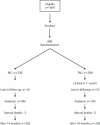Intervention for suicide attempters: A randomized controlled study
- PMID: 22135444
- PMCID: PMC3221182
- DOI: 10.4103/0019-5545.86817
Intervention for suicide attempters: A randomized controlled study
Abstract
Aim: To determine whether brief intervention and contact (BIC) is effective in reducing subsequent suicidal behavior among suicide attempters.
Materials and methods: Suicide attempters (n=680) admitted in a general hospital in Chennai were randomly allocated to treatment as usual and BIC whose components include brief intervention at the time of discharge and contact for 18 months.
Results: Completed suicide was significantly lower in the BIC group, OR 35.4 (CI 18.4 - 78.2) as also attempted suicide, OR 17.3 (CI 10.8 - 29.7).
Conclusions: This low-cost intervention which can be readily implemented may be an important suicide prevention strategy in healthcare settings in India.
Keywords: Attempted suicide; intervention; randomized trial.
Conflict of interest statement
References
-
- Krug EG, Dahlborg L, Mercy JA, Zwi AD, Lozano R. World report on violence and health. Geneva, Switzerland: WHO; 2002.
-
- Hulten A, Wasserman D, Hawton K, Jiang GX, Salender-Renberg E, Schimidtke A, et al. Recommended care for young people (15-19 years) after suicide attempts in certain European countries. Eur Child Adolesc Psychiatry. 2000;9:100–8. - PubMed
-
- Schimidtke A, Bille Brahe U, De Leo D, Kerkhof A, Bierke J, Crepet P, et al. Attempted suicide in Europe: Rates and trends and sociodemographic characteristics of suicide attempters during the period 1989-1992. Results of WHO/EURO Multi centre study on para suicide. Acta Psychiatr Scand. 1996;93:327–38. - PubMed
-
- Harris EC, Barraclough B. Suicide as an outcome for mental disorders: A meta-analysis. Br J Psychiatry. 1997;170:205–28. - PubMed


